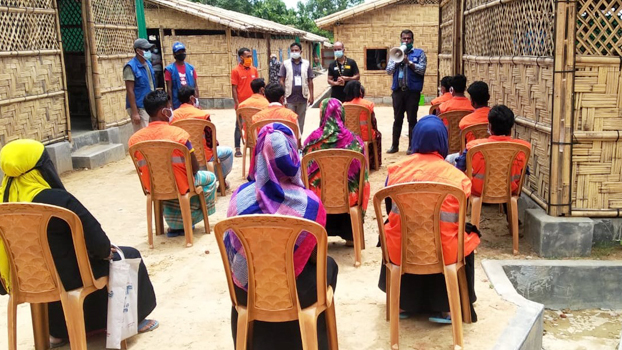Covid-19 healthcare facilities for Rohingya people increased


Organisations engaged in humanitarian assistance activities in Cox’s Bazar, have already expanded the scope of their activities for Covid-19 related healthcare.
The healthcare centres in the Rohingya camps are being re-equipped and new Severe Acute Respiratory Infections Isolation and Treatment Centres are being built. At the same time, it is important to increase efforts to dispel rumours and misinformation to ensure that refugees and local communities use these services.
“Before, we did not know how the Isolation and Treatment Centre looked on the inside. Information was limited about why this centre was set up,” said Momtaz, a Rohingya woman in Teknaf.
“Now we have a clear picture of what is inside the ITC and this is very helpful for us. I can share with my family, relatives, and neighbors about my experience,” she said after participating in a recent ITC service visit organised by the International Organization for Migration (IOM-UNHCR).
The facility with 60 beds, constructed by the International Rescue Committee (IRC), will open its doors next week. To relieve local apprehension and hesitation concerning COVID-19 health facilities in general, the International Organization for Migration’s Site Management and Site Development (SMSD) team organized visits from the refugee community to IRC’s ITC earlier this week.
Maintaining physical distance and hygiene practices, a total of 13 small groups (with a maximum 20 people per group) were selected from local religious leaders, community leaders, Extremely Vulnerable Individuals, women and girls, elderly, youth and learning centre teachers to learn more about the health response in-person.
The small groups visited each area of IRC’s ITC while IOM, IRC and World Health Organization (WHO) staff explained the facility’s purpose and answered questions.
Visits were monitored by the Refugee Relief and Repatriation Commissioner (RRRC) Camp-In-Charge Official Pulok Kanty Chakraborty, who expressed appreciation from the Government of Bangladesh for the awareness raising activities in the camp.
“By visiting this ITC, we saw everything, and we realize that such facility is prepared and ready to receive patients and treat them. From now we will share this information to our community people so that they will know about the services and if they need, they can come,” said Omar, a local Rohingya religious leader.
IOM Cox’s Bazar’s Site Management Coordinator in Teknaf, Connie Tangara, said, “The visit was organized to allow the community to experience a tour of the ITC first-hand before it becomes operational. It is essential that community members are informed, understand procedure inside the isolation facility and feel able to provide feedback on changes needed to enhance accountability.”
“Together with camp authorities and partners, IOM will continue the ITC awareness raising activities across Cox’s Bazar to foster local trust, increase the effectiveness of health activities and contribute to the overall Covid-19 response”, he added.



